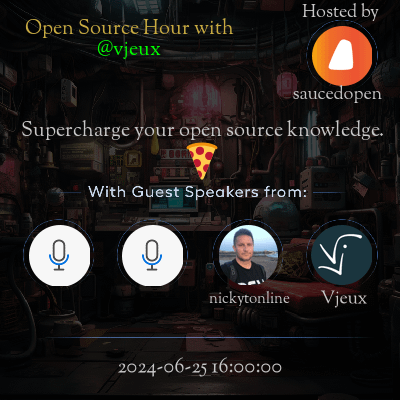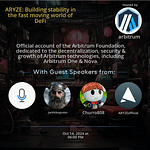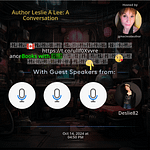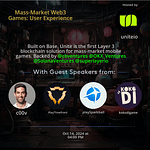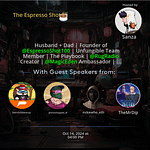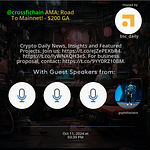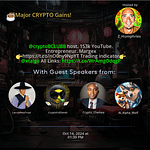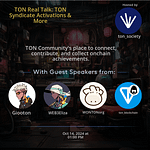Open Source Hour with @vjeux
This space is hosted by saucedopen
Space Summary
The Twitter space delved into the financial challenges faced by open-source projects, highlighting the importance of sustainable funding models. An upcoming initiative involves selling t-shirts to generate income for such projects. The conversation touched on the significance of supporting smaller projects that often struggle with funding and visibility. Contributors from large companies are shown to be more motivated by purpose rather than financial incentives. Overall, the space provided valuable insights into the dynamics of funding and support within the open-source development ecosystem.
Questions
Q: What was the main focus of the discussion?
A: The impact of funding on open-source projects.
Q: How are open-source projects currently funded?
A: Mainly through donations and sponsorships.
Q: What initiative was leaked during the space?
A: Selling t-shirts to support open-source projects.
Q: What challenges do smaller projects face in the open-source community?
A: Limited visibility and funding opportunities.
Q: Are contributors from big companies interested in financial rewards?
A: Many contributors are not motivated by financial gain.
Highlights
Time: 00:09:35
Transitioning to Full Page Layouts, Discussion on the shift from individual components to full page layouts in development.
Time: 00:11:20
Key Elements of Project Success, Insights on what defines a successful project in the open-source community.
Time: 00:19:09
Significance of Code Formatting, Exploring how automatic code formatting tools streamline manual tasks in development.
Time: 00:31:26
Predicting Ecosystem Changes, Speculations on the upcoming significant shifts in the software development ecosystem.
Time: 00:34:46
AI Tools Impact, Discussing the potential influence of AI tools like chat GPT on software projects’ future.
Time: 00:45:11
Benefits of Early Contributions, Exploring the advantages and obstacles of contributing to projects in early stages.
Time: 00:51:58
Addressing Maintainer Burnout, Highlighting the importance of acknowledging and tackling maintainer burnout in the open-source community.
Time: 00:57:05
Innovative Monetization Strategies, Considering unique approaches to financially sustain open-source projects, such as selling branded merchandise.
Time: 01:05:33
Future of Open Source Community, Closing remarks on the significance and outlook of the open-source community.
Key Takeaways
- Discussion on the funding gap for open-source projects.
- Importance of maintaining financial sustainability in open-source communities.
- Introduction of a new initiative to sell t-shirts for open-source projects and donate earnings.
- Challenges faced by smaller projects in terms of visibility and funding opportunities.
Behind the Mic
“So don’t have an out time for this conversation.”, “You can just get started.”, “So thanks, everyone, for joining us this afternoon.”, “And today I’m pleased to welcome Christopher Chedeau to the JavaScript Marathon.”, “Christopher is a software developer at Facebook and works on Prettier and React Native and many other cool projects.”, “Really excited to have him here today to talk to you about creating beautiful code.”, “Just a quick note for everyone tuning in.”, “Feel free to post your questions in the chat below, and we’ll try to address as many as we can during the session.”, “So with that being said, Christopher, let’s start from the beginning.”, “How did you get into software development?”, “I got into software development when I was, like, ten years old.”, “So my dad got a computer, and there was a programming book with it, and I just started playing with it, and it was amazing.”, “I loved it.”, “Then I got into the web when I was maybe 12.”, “I was building a website for my guild in WarCraft or something like this.”, “Then I got into, like, some more serious, like, computer science, and like, more disciplined coding, maybe five years later.”, “And this is where I went into, like, the best school in France and got my master’s degree.”, “And I actually got super bored because it was more about, like, theory and nothing very practical.”, “And I found a bunch of friends who were actually into coding for fun.”, “And this is how, like, everything started from there.”, “Nice.”, “Yeah.”, “And so could you tell us a little bit more about your first job in tech?”, “Yeah.”, “So my first job was actually Fun side project.”, “So Microsoft Project Natal, if you remember, like, it was before Kinect.”, “And so it was, like, a prototype.”, “And we redid, like, the Duster’s Academy, and we did a bunch of games based around the Kinect setup.”, “It worked for me really well.”, “It taught me a lot.”, “I learned a whole bunch of things because I was doing everything.”, “However, the experience brought me to, like, actually start searching for my next job.”, “Then I found Facebook, and I really loved all of the things they were doing.”, “And I also started, like, contributing to React Native.”, “The first time I started interacting with the open-source team, I just wanted to make something to work for my project.”, “Then I kept contributing and kept having fun with it.”, “And this is how I got into React Native.”, “Amazing.”, “And with all your experience in software development, what are your thoughts on open source?”, “So, I’ve learned a lot about open source.”, “Like, in the very beginning, I was, like, confused about why people were doing this.”, “And I thought that, like, free, like, I thought, like, people were, like, should be giving back something.”, “And then I started getting more and more into it and seeing how vibrant the community is.”, “And there’s so many different people working on this.”, “And I’m like, this is amazing.”, “And this is like something that I actually want to be a part of and spend some of my time in.”, “And one other thing is, like some companies are not really playing nice with open source.”, “And you actually, like, realize it and you start learning from those experiences and getting better at it.”, “And so, for example, one thing that I learned is that you should actually be really, really careful about like the code and especially if you work at a big company and make sure that it’s clean and things like this.”, “Otherwise, this is where things get complicated.”, “Got it.”, “I guess the next question would be, so for all of those who didn’t follow open source projects, like, what advice would you give them?”, “So for open source, I think, uh, first thing to realize is that if you never contributed to open source and you actually like, think you have code that is better than somebody else.It’s actually normal to feel like, really scared. And the very first contribution should actually be super small. You should actually spend, like, 90%, like, understanding what’s happening. 10% should be the actual pull request. Once you do, like, one or two small requests like this, this is where you start feeling good about it. And this is where this actually, like, all the magic, uh, starts happening. And just put the investment in there and then you’ll get started. This was maybe the hardest part, like getting started. And so this is the advice that I have.”, “That’s great advice.”, “Now you currently, you work on, so, uh, at Prettier and you do a bunch of contributions for React Native. So what, tell me more about like your role at Facebook right now. What kinds of projects are you working on this?”, “Yeah. So Prettier is one example, but I also worked on a bunch of other projects at Facebook.”, “And so the way I ended up here and getting to work on it is because at the beginning, at Facebook, I was like on the kind of Hollywood project where I was building a bunch of things.”, “And at some point I was like, oh, I want to be an engineer.”, “And so I just wanted to be the best engineer and be the person that people go to when they want to do things really well.”, “And so I just wanted to, yeah, so like CocoaPods is one of the things that I got into.”, “Uh, Prettier is another one.”, “And I was working on some other internal tooling.”, “For the internal tooling project, what kind of projects were you working on?”, “It was like, I think the latest one was, for example, Mercurial.”, “So we came up with an entirely new development experience, which is, like, way better.”, “The way I see the world is I want to reduce the user friction of people when they’re using tools.”, “And so they can have more time developing their actual applications.”, “And this is the way I see, like, developer experience in general.”, “Very cool.”, “Okay.”, “So switching gears a bit.”, “What else are you looking into these days?”, “Like, what’s new on the maybe personal or professional front?”, “So me, uh, personal and professional front is like, mostly the same things because I work on coding.”, “Uh, right now I have this secret project, and I think it’s going to ship in one or two weeks.”, “And it’s also something that I’m really passionate about, which is education.”, “And so I think, yeah, so building something that is mostly going to be online and going to teach people to code.”, “And I’m also into browsing more languages.”, “And if someone is interested, I think Zig is one of the very interesting languages nowadays.”, “Very cool.”, “We do have some questions from the chat.”, “So the first one would be, how do you stay motivated to keep contributing in open source?”, “Motivation is hard.”, “The way I feel is once you see people using the things you build, this is where, like the motivation actually comes from.”, “And for like, Prettier, for example, there’s more than 20 million downloads every month.”, “And so no matter what, like, I use a tool and I know a lot of people use the tool.”, “And this is super cool and this is what motivates me.”, “And the very first few years, like before things gets popular, it’s really hard to keep motivating.”, “But you see some of your friends being interested, some people being excited about the project.”, “And I feel this is actually what keeps me going.”, “Nice.”, “And so the next question we have is, in your opinion, how do you determine which open source projects to contribute to?”, “So this is like, I don’t think there’s any specific way to do this.”, “So for me, how it started was I was using React Native and I found some bugs and I fixed them.”, “And from there I started getting more and more into it.”, “Open source contributions are not always connected to the tool that you’re using at your job or just any tool that you use regularly.”, “It can be basically anything you find useful or exciting.”, “I think this is the answer.”, “And some aspects of this are, like really, really interesting.”, “So for example, at Facebook right now, if you actually want to work for open source companies, like there are quotas.”, “And so like 20% of the time you work on open source and you can choose whenever you want.”, “And this is like a huge motivation for people to actually start contributing to open source.”, “And even though you are forced, this is not really enforced, but it is a huge push.”, “That’s very interesting.”, “The next question is if you think about teams that want to support open source development, and I think you touched on this a bit, but could you help them, like, figure out, like, if their company wants to sponsor and scare things, please do it.”, “That would be super helpful.”, “The other thing, I’m super excited.”, “I’m going to leak a bit.”, “But the syntax folks are working on the way to, like, print tshirts and sell tshirts for open source projects and like, to give the, like, the winnings, like the earnings of the tshirts to the open source projects.”, “So stay tuned in the next few weeks if you want pretty artist shirts.”, “So this is the kind of things now in practice, like, this amount is working really well for, like, big projects.”, “Like Prettier, which is, like, used everywhere.”, “And even though there are small amounts, like $140,000 is not even like one year worth of a fang salary.”, “So this is going to be really interesting to see what the future looks like for the smaller projects or the less visible projects.”, “So I don’t have a really good solution, but this is a very interesting thinking.”, “One thing also I realized is that a lot of people contributing to this project are actually working in big companies and are making a lot of money and actually don’t want money involved.”, “Yes, I think that’s a great way to close out.”, “Thanks so much for being here with us today.”, “Think I could have talked to you for at least another 3 hours.”, “So this was wonderful.”, “Your experience is really useful.”, “I do really appreciate your time.”, “Thank you.”, “Becca.”, “Nick, it was amazing to be talking to you.”, “Just a quick announcement.”, “Thanks to everybody here that was listening and participating.”, “Let me know if you have any other questions.”, “We will be having our Twitter space again next week, but it will be on Monday, July 1 at 01:00 p.m.”, “with John Papa from Microsoft.”, “So definitely check that out.”, “We’re going to be talking about an open source approach to development.”, “And we again, thank you, Christopher, for being here, and we’ll see you all next week.”, “Bye.”
